
Educational Studies in Mathematics
metrics 2024
Unveiling New Horizons in Educational Mathematics
Introduction
Educational Studies in Mathematics, published by Springer, is a prestigious journal dedicated to advancing the field of mathematics education. With an impressive impact factor and a distinguished Q1 ranking in both the Education and Mathematics categories as of 2023, the journal plays a vital role in disseminating high-quality research and innovative methodologies. Since its inception in 1968, it has continually provided a platform for educators, researchers, and policymakers to explore the multifaceted relationship between mathematics and education, emphasizing theoretical frameworks, practical applications, and empirical studies. Situated in the Netherlands, this journal boasts a remarkable reputation with its Scopus rankings, placing it among the top percentile in both Mathematics and Social Sciences. Although it does not currently offer open access, Educational Studies in Mathematics remains a crucial resource for those committed to enhancing mathematics education globally.
Metrics 2024
 1.48
1.48 3.40
3.40 3.60
3.60 83
83Metrics History
Rank 2024
Scopus
IF (Web Of Science)
JCI (Web Of Science)
Quartile History
Similar Journals

Journal fur Mathematik-Didaktik
Empowering Educators with Cutting-Edge InsightsJournal für Mathematik-Didaktik, published by Springer Heidelberg, is a leading academic journal that has been at the forefront of mathematics education research since its inception in 1980. Operating under ISSN 0173-5322 and E-ISSN 1869-2699, this esteemed journal serves as a platform for disseminating rigorous research findings, innovative teaching methods, and theoretical frameworks aimed at improving mathematics instruction. With a notable Q2 ranking in both Education and Mathematics (miscellaneous), the journal has gained recognition for its impactful contributions, evidenced by its position within the 75th percentile in General Mathematics and >50th percentile in Social Sciences Education on Scopus. Scholars and practitioners benefit from its commitment to advancing educational practices, while readers enjoy access to a wealth of knowledge that addresses current challenges and trends in mathematics teaching and learning. Designed for educators, researchers, and students alike, the Journal für Mathematik-Didaktik is an essential resource for those looking to enhance their understanding and practice in the ever-evolving field of mathematics education.
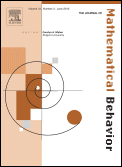
Journal of Mathematical Behavior
Cultivating a Community of Mathematical ExcellenceThe Journal of Mathematical Behavior, published by ELSEVIER SCIENCE INC, is a premier interdisciplinary journal dedicated to the exploration of mathematical thinking, learning, and education. With a strong history of publication since 1994 and converging towards 2024, this journal offers vital insights and innovative research in the fields of Applied Mathematics, Applied Psychology, and Education, holding notable rankings in various categories, including Q1 in Education and Q2 in both Applied Mathematics and Psychology as of 2023. The journal is positioned favorably in Scopus rankings, highlighting its impact in the realms of Mathematics and Education. It serves as a critical platform for researchers, educators, and practitioners aiming to enhance pedagogical strategies and foster effective mathematical understanding. Although it does not offer open access, the journal remains a cornerstone for advancing knowledge and dialogue within the mathematical education community,** making it an essential resource for anyone invested in the complexities and applications of mathematical behavior.
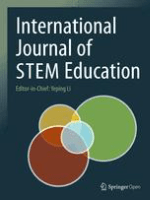
International Journal of STEM Education
Shaping the Future of STEM Learning GloballyThe International Journal of STEM Education, published by Springer, is a leading open-access journal dedicated to advancing the field of STEM (Science, Technology, Engineering, and Mathematics) education. With its ISSN 2196-7822 and e-ISSN 2196-7822, the journal has established a significant presence in its domain since its launch in 2014, operating with an increased depth of scholarship through 2024. Hailing from Switzerland and addressing a global audience, the journal has achieved a remarkable ranking of Q1 in Education for 2023, placing it in the top tier of its field. The journal is ranked 26th out of 1543 in Social Sciences - Education according to Scopus metrics, highlighting its influence in shaping contemporary educational practices. By offering a platform for high-quality research articles, reviews, and case studies, the International Journal of STEM Education aims to promote effective teaching methodologies and innovation in STEM pedagogy, catering to researchers, educators, and policy makers alike. The commitment to open access ensures that the knowledge generated is readily available, fostering collaboration and dissemination of cutting-edge developments in STEM education.
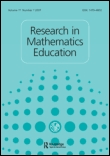
Research in Mathematics Education
Shaping the Landscape of Mathematics Education ScholarshipResearch in Mathematics Education is a premier academic journal published by Routledge Journals, Taylor & Francis Ltd, focusing on the critical field of mathematics education. Established in 1998, this journal has earned a reputation for fostering innovative scholarship and research that advances the understanding of teaching and learning mathematics. With its impressive Q2 ranking in both Education and Mathematics (miscellaneous) categories for 2023, and a notable Scopus rank of 60th in General Mathematics, it serves as a vital resource for researchers, educators, and policymakers alike. While it does not offer Open Access, the journal’s rigorous peer-reviewed framework ensures that only high-quality articles are published, contributing significantly to both theoretical and applied aspects of mathematics education. Its commitment to excellence is reflected in its ongoing aim to disseminate impactful research, making it an indispensable resource in the academic and educational communities.
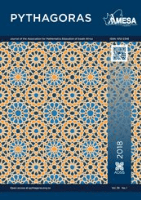
Pythagoras
Unlocking the potential of interdisciplinary collaboration.Pythagoras is a pivotal peer-reviewed journal published by AOSIS, dedicated to advancing interdisciplinary research in the fields of Education and Mathematics. Established as an Open Access journal since 2004, Pythagoras amplifies the dissemination of scholarly work, ensuring global accessibility to its contents. With an ISSN of 1012-2346 and an E-ISSN of 2223-7895, this journal plays a significant role within its scope, evidenced by its placement in the Q3 quartile for Education and Q4 for miscellaneous Mathematics categories in 2023, along with respectable Scopus rankings. Operating from South Africa, with a mission to explore the intersections of education and mathematics, Pythagoras invites researchers, educators, and students alike to contribute to its dialogue, fostering innovation and collaboration in these essential fields. The journal’s focus remains on promoting high-quality research that addresses critical challenges and developments within these disciplines, making it a vital resource for scholars aiming to enhance their academic pursuits.

Journal of Mathematics Teacher Education
Empowering Educators Through Innovative ResearchJournal of Mathematics Teacher Education, published by SPRINGER, serves as a pivotal platform for scholarly communication in the fields of Education and Mathematics. With a distinguished Q1 ranking in both disciplines and exceptional Scopus rankings—placing it in the top 94th percentile for Mathematics and the 84th percentile for Education—the journal is dedicated to advancing research and practice in mathematics education from a global perspective. Established in 2005 and converging towards 2024, it invites contributions that investigate innovative teaching strategies, curriculum development, and teacher education methodologies. Although the journal does not offer Open Access, its rich collection of empirical studies, reviews, and theoretical articles provides invaluable resources for educators, researchers, and students aiming to elevate the quality of mathematics instruction. Situated in Dordrecht, Netherlands, the Journal of Mathematics Teacher Education remains a significant asset to the academic community, fostering discussions that drive progress and enhance student learning experiences.

Edma 0-6-Educacion Matematica en la Infancia
Fostering Mathematical Foundations for Young Minds.Edma 0-6-Educacion Matematica en la Infancia is an esteemed academic journal dedicated to exploring the methodologies and practices of mathematics education for children aged 0 to 6 years. Published by the UNIV COMPLUTENSE MADRID, GRUPO INVESTIGACION & DIDACTICA MATEMATICAS, this journal serves as a platform for researchers, educators, and practitioners who aim to enhance early childhood mathematics education through innovative insights and comprehensive studies. While its impact factor is yet to be established, the journal is poised to contribute significantly to the field, promoting an open dialogue on instructional strategies, curriculum development, and pedagogical frameworks. The journal is accessible through its Open Access policy, ensuring that valuable research reaches a wider audience without barriers. With the growing recognition of the importance of early mathematics education, Edma 0-6 aims to be a cornerstone resource, empowering stakeholders to shape meaningful learning experiences for young learners. Submissions and inquiries can be directed to the Department of Mathematics Didactics at the Universidad Complutense de Madrid, located in Madrid, Spain.

International Electronic Journal of Mathematics Education
Transforming Educational Practices with Rigorous ResearchInternational Electronic Journal of Mathematics Education (IEJME) is a premier platform dedicated to advancing the field of mathematics education through rigorous research and innovation. Published by MODESTUM LTD, this interdisciplinary journal focuses on the pedagogical, theoretical, and empirical aspects of mathematics education, facilitating a deep understanding of teaching practices, learning methods, and curriculum development. With its commitment to open access, IEJME ensures that research findings are accessible to a global audience, fostering collaborative efforts among educators, researchers, and practitioners. The journal has maintained a commendable position in academic rankings, holding a Rank of #114/399 in General Mathematics and #782/1543 in Education within Scopus, highlighting its significant contribution to the scholarly community. By publishing high-quality research from 2009 to 2016 and 2021 to 2024, IEJME continues to serve as an essential resource for those invested in enhancing mathematical understanding in educational contexts, inspiring future generations of mathematicians and educators.
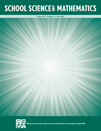
School Science and Mathematics
Inspiring educational innovation at the intersection of science and mathematics.School Science and Mathematics is a prestigious academic journal published by WILEY, focusing on the intersection of education, mathematics, and the sciences. With an ISSN of 0036-6803 and an E-ISSN of 1949-8594, this journal has been a vital resource for educators, researchers, and practitioners since its inception. Indexed in top-tier databases, it boasts impressive Scopus rankings with a Q1 classification in History and Philosophy of Science and a consistent Q2 positions in Education and Engineering, showcasing its impact within the academic community. The journal aims to enhance the teaching and learning of science and mathematics by publishing high-quality, peer-reviewed research that informs best practices and innovative approaches in education. Operating from the United States, it attracts contributions that influence educational strategies and curriculum development across varied disciplines, making it an essential venue for those engaged in advancing knowledge within these fields. Access to its insightful articles can enrich your understanding and drive dialogue among scholars dedicated to improving science and mathematics education.
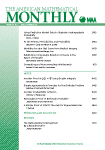
AMERICAN MATHEMATICAL MONTHLY
Fostering Dialogue Among MathematiciansAMERICAN MATHEMATICAL MONTHLY, published by Taylor & Francis Inc, is a prominent journal in the field of mathematics, recognized for its contribution to the dissemination of mathematical knowledge and pedagogy. With its ISSN 0002-9890 and E-ISSN 1930-0972, this journal has been a cornerstone for mathematicians since its inception, continuing to provide scholarly articles, educational materials, and insights into contemporary mathematical research. Although it follows a subscription model without Open Access options, its Q2 ranking in the Mathematics (miscellaneous) category reflects its reputable standing among peers, emphasized by its Scopus rank in the 22nd percentile. Based in the United States at 530 Walnut Street, Ste 850, Philadelphia, PA 19106, the journal spans topics that cater to both advanced researchers and aspiring students, facilitating an engaging dialogue within the mathematical community.